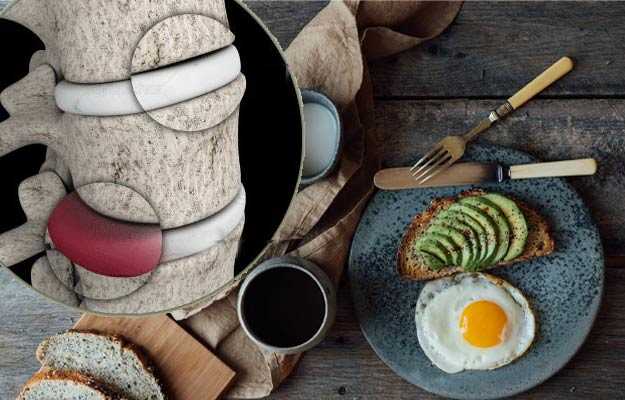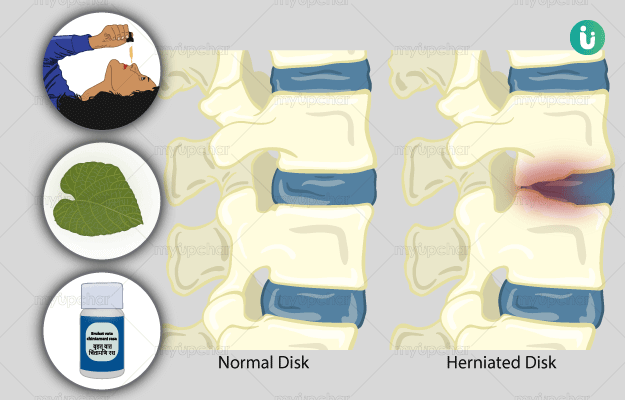A slipped disc, also known as a prolapsed disc, is caused when a spinal disc bulges out. Spinal discs work as shock absorbers between each vertebra to prevent our spinal cord from jerks and pressure and to support day-to-day activities like walking, lifting, running, etc. These spinal discs also protect our nerves near our spinal area. In this condition, the bulging disc creates pressure on the nerves, which causes pain and inflammation in that area. Lower back pain, inability to perform daily activities and pain associated with sitting and moving positions are the common symptoms of this condition. In conjunction with the treatment plan prescribed, there are some nutrients and food items that can be had to relieve the pain and improve the condition. In this article, we will discuss such foods in more detail.
- What to eat when you have a slipped disc
- What not to eat when you have a slipped disc
- Indian diet plan for a slipped disc
What to eat when you have a slipped disc
Following are some of the food items that can improve your condition:
Fish with bones
Small fish that can be consumed as a whole are rich in vitamin D and calcium. As these are essential nutrients for bone health, they can be helpful in aiding your recovery. Fish is also a great source of omega 3 fatty acids, which are known for their anti-inflammatory benefits.
(Read more: Besh fish to eat in India)
Oranges
Oranges are rich in vitamin C, which works as a collagen builder. It helps build connective tissues such as muscles, tendons, ligaments and skin. Vitamin C is also known as a strong antioxidant that helps heal different types of injuries like injured muscles, ligaments and vertebrae discs as well. Try to add 1-2 whole oranges to your daily diet.
Walnuts
If you are vegetarian, walnuts can be a great option to help you heal from this condition. Walnuts are rich in omega 3 fatty acids and protein, which help reduce inflammation and heal the injured disc. Omega 3 fatty acids are also known to treat neurological problems that are common during this condition. You can have this superfood as a tea-time snack, in a Waldorf salad or in your dessert.
Milk and milk products
Milk and milk products are rich in calcium, phosphorus and protein, all of which are key nutrients for spinal health. But due to inactivity in this condition, full-fat dairy products can lead to obesity. So opt for low-fat dairy products such as milk, curd/yoghurt, buttermilk and paneer when you can. For wholesome benefits, have at least one milk product with every meal.
Ragi
If you are vegetarian and lactose intolerant as well, choosing calcium-rich foods can be a challenge. Ragi is a great solution for you, as 100 grams of ragi contains 344 mg of calcium. You can have this superfood in the form of a cheela, dosa, porridge or can even add to your soup.
Eggs
Vitamin D helps our body absorb calcium. In India, 80-90% of the population is deficient in vitamin D, which is the chief problem for weak bones and other bone-related complications. Eggs are rich in vitamin D as well as protein, vitamin A, vitamin B12, calcium, etc. To recover from a slipped disc, try to have at least one whole egg every day.
Green and leafy vegetables
Green leafy vegetables are rich in vitamin K. Vitamin K is known to help with blood clotting, keeping the bones healthy and other bodily functions. It also plays an important role in binding the calcium in your discs to make them strong and avoid future injuries. Try to include all the seasonal green vegetables such as spinach, amaranth, fenugreek leaves, cabbage, etc in your daily diet. You can have them in the form of a salad, soup, curry and more.
Turmeric
Turmeric is now a world-famous ingredient because of the curcumin compound. Curcumin is known for its anti-bacterial, anti-inflammatory and antioxidant components. During a slipped disc, inflammation near the injured disc is very common. Consuming turmeric on a regular basis can help reduce this inflammation and pain. Aim to have 2-5 grams of turmeric daily; you can have it in your tea, curry, lentils or as a capsule.
Green tea
Green tea contains a strong antioxidant called catechin. Catechin helps prevent cell damage and reduce inflammation. Try to drink 1-2 cups of green tea on a daily basis. Since green tea also contains caffeine, avoid having it just before or after a meal. Maintain a two-hour gap between food and green tea to avoid malabsorption of important nutrients.
Almonds
Almonds are a rich source of vitamin E, a beneficial nutrient that keeps skin and hair nourished, protects joints from cell damage, promotes the health of reproductive organs and more. Almonds are also considered to be an anti-inflammatory food that helps to reduce swelling and pain during this condition. Try to eat almonds that have been soaked in water overnight for better absorption of the nutrients.
Colourful fruits
Colourful and seasonal fruits are rich sources of vitamins, minerals and antioxidants that help our body heal properly, reduce the risk of cell damage and lessen the inflammation during slipped disc. Seasonal and whole fruits are a powerpack of all these nutrients, so try to have them naturally and avoid processed products like fruit juices. You can have apples, mango, banana, papaya, melons, kiwi, etc.
What not to eat when you have a slipped disc
Just as some foods can aid recovery rom a skipped disc, other food items can worsen your condition as well. Following are some foods you should try to avoid:
- Sugar: Studies suggest that consuming excessive sugar can increase inflammation in the body, especially in the injured area, which can increase nerve damage and nerve pain. So watch your sugar intake by cutting down consumption of white sugar, fruit juices, carbonated drinks, cakes, pastries and sweets. You can replace them with healthier options such as fruits, dates, jaggery, buttermilk, lemon water, etc.
- Processed food: Processed foods are high in sodium, trans fat and harmful chemicals, all of which can increase inflammation and worsen the pain in this condition. It’s best to avoid packaged and preserved food. Steer clear from foods like jam, jelly, ready-to-eat meals, namkeen, biscuits, french fries, burgers and pizza and replace them with home-cooked and healthy food items.
- Alcohol: Studies have shown more inflammation markers in people who consume alcohol regularly. So if you do consume alcohol, it is recommended that you stop immediately for your condition to improve sooner.
Indian diet plan for a slipped disc
Following is an Indian meal plan that can help reduce inflammation and pain and heal a slipped disc properly:
- Early morning: Warm Water (1 glass) + almonds (6) + walnuts (3-4)
- Breakfast: Banana and oats pancake (2) + papaya smoothie (1 glass)
- Mid meal: Orange (1)
- Lunch: Methi chapati (2) + lauki kofta (1 bowl) + kachumber salad (1 bowl)
- Evening tea: Turmeric tea (1 cup) + roasted makhana (1 bowl)
- Dinner: Vegetable soup (1 bowl) + matar pulao (1 bowl) + paneer/fish curry (1 bowl)
- Bedtime: Turmeric milk (1 glass)














